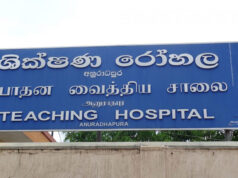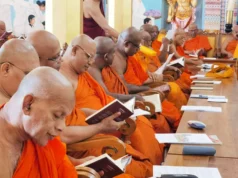The Parliamentary Oversight Committee on National Security has strongly advised the Wickremesinghe-Rajapaksa government against privatising Sri Lanka Telecom (SLT).The 11-member committee, in a report, titled ‘the effects of privatisation of SLT on national security’, which was tabled in Parliament yesterday (09), warned of far reaching consequences of privatisation.
Chairman of the Committee, one-time Deputy Chief of Staff of Navy, Rear Admiral Sarath Weerasekera told The Island that the government should be mindful of the dangers emanating from the much-touted privatisation programme. “Privatisation is certainly not the panacea for all our problems,” the former Public Security Minister said, asserting that the vital telecommunications sector, in private hands, could pose quite a threat to national security.
Field Marshal Sarath Fonseka (SJB) is also a member of the Committee, set up in terms of Standing Orders No 111. Its other members are Chamal Rajapaksa, Chandima Weerakkody, (Prof.) Channa Jayasumana, Charles Nirmalanathan, Sampath Athukorala, U.K.Sumith Udukumbura, (Dr.) Major Pradeep Undugoda, Major Sudarshana Denipitiya and Nimal Piyathissa.
The UNP, which has only one National List member, is not represented in the committee. Lawmaker Weerasekera said that the loss of SLT to ‘outsiders’ could jeopardize national security and expose the country to unprecedented threats.
President Ranil Wickremesinghe has declared both in and outside Parliament the need to privatise the SLT among other public enterprises.The report warned of the grave risk of the LTTE remnants, Tamil Diaspora and others, who backed the separatist agenda here, investing in the SLT.
Declaring that anyone who has backed the LTTE, even remotely, is a terrorist, MP Weerasekera said that such persons/institutions/ groups/organisations should not be allowed to buy any shares. The SLN veteran emphasized the responsibility on the part of the government to take bold decisions. Could we have the national telecommunications provider to the State in the hands of hostile elements, MP Weerasekera asked.
The then CBK administration partially privatised the SLT in 1994. Nippon Telegraph & Telephone Corporation of Japan secured 35% of the SLT but those shares were bought by a Netherlands-based company, called Global Telecommunications Holdings wholly owned subsidiary of Malaysian Usaha Tegas Sdn Bhd. As at today the Malaysian Company holds 44.98% of the stake and the Government holds 49.50%.
With a countrywide customer base of nine mn, the income revenue of SLT in 2022 was Rs. 108 billion and the profit was Rs. 8.46 billion.
The report dealt with threats posed to economic security, energy security, food security, etc., and most importantly cyber security. The report warned the management of a foreign company that may take over the SLT, would be naturally bent to the political policies of the country they belong to.
The committee made the following recommendations:
i. SLT is already partially privatised with international companies holding 44.98% of the stake and the government holding 49.5%. Further privatisation would expose the country’s critical communication infrastructure/sensitive information to private entities whose profit-oriented interests can compromise national security. Hence privatisation of Telecom is not recommended.
ii. Anyone/organisation who had been blacklisted/helped terrorists/extremists in any form should not be allowed to buy any share and have any control over our national assets.
iii. State can buy back the other large shareholder of Telecom as provided for in the agreement, divide the segments into sensitive and vulnerable, excess lands and buildings, critical infrastructure and the business. Whilst retaining the first segments affecting National Security, the state can divest the others holding a major share through Private Public Partnership ensuring critical infrastructure is protected and all government regulations are adhered to. This way the government can exit from doing business whilst making profit and ensuring National Security.








